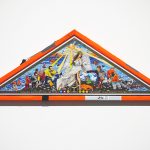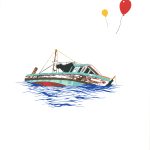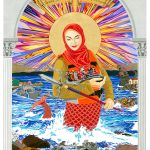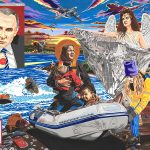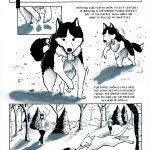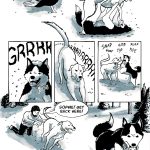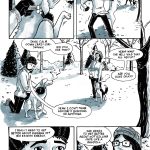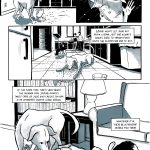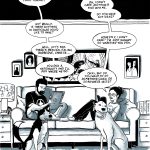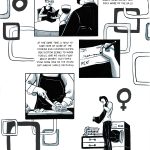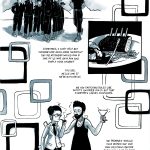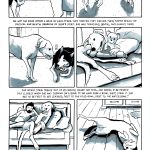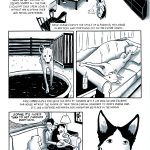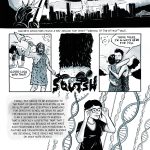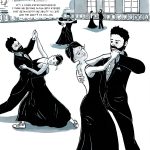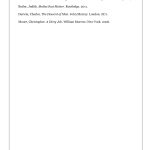





Ana Castillo is a much-celebrated voice in Chicana literature and feminism, or, as she puts it, “xicanisma,” a term she coined to describe a non-binary approach to the issues of gender, class, and race. Her publications include eight novels, one collection of short stories, five collections of poetry, a two-play volume, and a children’s book, and, as well as two books of nonfiction, the latest of which, Black Dove: Mamá, Mi’jo, and Me (Feminist Press, 2016), was recently out when this interview was conducted in November of 2016. She has also edited three collections of Latina/o literature and translated a Spanish-language adaptation of Cherrie Moraga’s The Bridge Called My Back: Writings by Radical Women of Color, one of the touchstones of efforts to challenge the lack of women of color in the feminist movement. Her novel Sapogonia was named a New York Times Notable Book, and she has received numerous awards, including National Endowment for the Arts fellowships, a Before Columbus Foundation American Book Award, a Carl Sandburg Award, a Sor Juana Achievement Award, and the American Studies Association’s Gloria Anzaldúa Prize. She holds a B.A. in art from Northwestern Illinois University, an M.A. from the University of Chicago, and a Ph.D. from the University of Bremen, Germany, and was appointed the first Sor Juana Inés de la Cruz Endowed Chair at DePaul University, as well has having taught at numerous other colleges and universities.
An excerpt from Black Dove appears in 41.2 of the print Florida Review, and the book is reviewed here in Aquifer.
Lisa Roney for The Florida Review:
I’ve admired your work for a long time, and the first thing I wanted to say was what a gripping read Black Dove is. Tell me about this book and about how it evolved for you.
Ana Castillo:
It’s a compilation of personal essays and memoir, and I distinguish the two things—the essays were written for a more general audience and with a theme in mind, and the memoir comes from a very much more personal place. The earliest one, which is also the leading one, is called “My Mother’s México,” and I wrote and published it in the early nineties—’94, I think it first came out. I always thought that I would do a collection of essays eventually called “My Mother’s México,” and it would be along the lines of being a daughter and having been my mother’s daughter and so forth, but as time went on my role in life became more as mother than as daughter. My mother passed on over twenty years ago, and I raised my son almost all his life as a single mother.
That’s a really important part of this book—being a single mother, being a brown woman in this country with a brown young man that was growing up. Whether or not a single mother can successfully raise a man is always in question. I think I did a good job as long as he was on my watch. He did well in school, he went straight through university, got his degree, he became a dad and was supporting his family during the recession, but then became very depressed and began to spiral. I didn’t really know what was going on—he’s already an adult at this point, in his mid-twenties, and has his own little family to take care of, so as a mother I’m a little bit more on the outside—and when he hit bottom he committed a senseless robbery—of an institution, unarmed. It felt like he was ejecting himself from the world of society, and that was really the catalyst eventually for much of what I wrote.
His voice is also included in the book from some of the letters we exchanged. We decided to share the story. We are in a country that that supports a multibillion-dollar prison industry. We find all kinds of people becoming felons at the time that my son was arrested—in Chicago, two governors of Illinois were in federal prison at the time!—but whereas those guys will come out and have their friends and their connections and they will have work and will have homes and places to go, many of our incarcerated, when they’re felons, they come out and then they have to face the challenge of not being given jobs that they’re qualified for. They have children, families to support and to house. They are not rented to, they can’t get a home, they can’t get loans. So, we are perpetuating a society in which we continue to castigate individuals, but sort of encourage them some in some cases to continue that cycle.
My story turns out to be a good one. My son came out, he was well, he was ready to take on his life, and he’s an awesome dad with a growing little girl, but he has had those challenges. It was because we wanted to share that story that that I decided to put this collection together.
TFR:
And there are ways in which that content and theme is supported even from the first word. I found the structure of the of the book quite moving because you set it up as it is a family saga, so right away you acknowledge it goes beyond you individually. There was this sense of family and people and community and the way they all work together.
I want to ask about to what extent that trauma of having your son incarcerated turned you toward the book-length memoir. You’ve been writing these pieces for some time about your mother and so on, but do you think that there was a way that this was a point where you felt, I have to speak as myself, not as a fictional character, about this kind of situation? Was it related to a different type of activism for you than fiction or poetry?
Castillo:
Yes, indeed. I think that it was. A big, big part of my life is having been a mother. It was something I chose to do. When I chose to become a mother, it was just before the precipice of when we begin to get U.S. Latinas recognized in this country as writers, as part of a generation of writers. So, I had to have a vision of myself being a mother—What does that mean? How does that change my life?—but, also, I’m not going to give up this vision of being a writer and being published in a country that has no history of that. Those things have been really important for me—being vocal and being part of this large community of Latinos and people of color in this country. My writing has been my form of activism. But my heart was so broken with my son being broken that ironically initially I couldn’t even write in my journal. I was that broken-hearted. I knew that the gods had given him and given me a second chance because he at least had not been killed and had not killed himself—and there were many opportunities in the society that I’m talking about in which that could happen to a young man of color, not only during his senseless criminal act, but he also as a teenager had been involved in graffiti and lost a lot of friends on the streets of Chicago. There’s “stop and search,” and my son had been beaten up by the police for no reason except getting off at the train station with a couple of guys, and maybe, maybe, if you acted up or responded, that’s what happened. So, this was building up, but I thought by the time he was a young family man in his late twenties, Well, we’re home free, and yet he had become this very angry man, as many males of color have a right to be.
This is where I was losing my voice, so to speak, as far as writing so that initially I couldn’t write at all about it. We came together—and we have some of that in this book—my son and I came together, interestingly enough, through our love of books and writing. There’s an exchange of excerpts of our letters in the book, how I began to reach out to him and bring him back. There was a lot of cognitive dissonance beforehand, no connection. He played cello in high school, but he didn’t talk about music and he didn’t know how or want to play music anymore—just gone. So, how do we begin to have conversations and discussions? We did that through books. He would ask for books, and I sent them to him, and I would read them.
In the process of this we shared Charles Bukowski—he wanted to read Bukowski’s poetry, and I read his prose. It kind of inspired me, and, in the process of this moment, I actually whipped out a novel called Give It to Me, which was published by the Feminist Press, and it was so far away from what I was experiencing—this sort of (I hope) funny, really quirky story where she [the main character] was having a lot of sex in the midst of this crazy, old politics. It was just like, Let me escape. So, I did that. I got the writing going again, the fiction.
Eventually, we decided to share our story because we do have a lot of communities across the board—racially, because of gender or religion, or otherwise demographically—that are made ashamed and are being punished by this culture.
TFR:
Even often there is that sense of Well, if you’re a well-behaved person of color, this isn’t gonna happen to you. I was very glad and moved that you went out on the limb and said, No, I did everything right, and it didn’t matter. My son was still subject to these forces, and he did everything right—he went to college, he was taking care of his family, and yet there was still this justifiable anger that had to come out somehow.
Castillo:
And at no time does he or do I excuse his behavior. He went out and he committed a senseless robbery, though he did not threaten anybody. It was the accumulation of anger that he had felt toward the system and what was going on—this was during the fallout with the banks and everything else that was happening. It’s not to excuse breaking the law.
By the same token, I talk about the fact that I know that he smoked weed, which I don’t have a moral objection to or anything, and some of this was self-medicating. Again, I’m not making excuses, I’m not saying it’s okay. I had taken him to Amsterdam when he was in college—I did a reading in Germany, and we went off to Amsterdam—so, it’s okay if you’re in Colorado, it’s okay now in California, but if it’s not okay don’t get caught with it. Once again, it’s no excuse if you get caught with it, and that was part of what was going on with him at that time, a resentment over the hypocrisy.
Nevertheless, [as a society] we’re not looking at the constant harassment of people of color. In this case, as a mother of a son, I’m looking at men being harassed and what happens. Again, it’s not to justify some reaction that’s illegal, but this is who you’re forming. I grew up as a brown girl in Chicago, and I had a lot of anger throughout my twenties. I actually went to graduate school at the University of Chicago, so I was a bright, self-motivated woman, but was always getting stopped, even then, by police, with your standard excuse about the taillight to ask you about your papers. It builds up in people.
TFR:
It does, absolutely. I’ll come back to the social commentary aspects, but I wanted to ask about how, even though there is anger and tragedy woven through this book, and also a kind and also a mystical tone that is quite beautiful and poetic, there’s also the sassy in it as well and little moments of humor. Could you comment about the role of humor in the book and how you see that? Was it something that you worked on or was it just something that came out of you naturally as a sort of antidote or complement to the other emotions that this book so strongly brings?
Castillo:
You know, writing funny is very hard. Writing humor is difficult, and when I when I knocked out Give It to Me, I really needed some levity my life. It was tragic—I was comparing my son in my head to, like, Odysseus, though he’s not a king and not a hero, but the mother ends up in Hell. I often come up with these connections in my head, and so I twist that and find irony—more than funny, I look for irony. That’s important, when you’re telling a story, whether it’s a quote-unquote true story, nonfiction, or you’re making up a story, and you’re giving it to the reader, you’ve got to have some moments of levity to give the reader a respite, a little island, an oasis. I’m happy that the book has some of that, not necessarily always together in the same essay but in other places.
My aunt, my mother’s sister, was always and remains a very colorful character, and certainly because of her joie de vivre, which she was born with, I was able to get a little levity to balance my mother’s somber personality. In the book, I talk about the influence of my aunt in my life and the things that I saw with her—the flirtation, her love of cooking, her flair for dressing, and so on—and all despite her very humble lifestyle. I think that there’s part of that in my personality, and this is how I can get through life—by thinking of the irony of certain situations.
At the same time, as a writer, even as a poet, you have to give your reader a break. If it’s pretty relentless but it has to be told, you have to have a host a little way-station for people so that they can catch their breath and then go on
TFR:
And maybe for yourself as a writer, too.
Castillo:
Absolutely.
TFR:
Speaking of your Tía Flora’s personality, there is a video of you online, in which you talk about how important Germaine Greer was to you in bringing up for you that challenge of being happy as a woman in our society, and I thought that the portraits of your somber grandmothers and mother contrasted really with the indomitable, lively portrait of Flora. What do you think about the balance of those different influences on you?
Castillo:
Just let me say that my Tía Flora is eighty-six. She’s outliving everybody. This just made me think about it. Maybe there’s something to that ability to laugh through all kinds of hardships. She had by no means an easy childhood in México City. She was orphaned, she married young, her husband was killed, she had two children at that time. She came to Chicago, became a seamstress in a little kind of quasi-sweatshop factory in the Mexican neighborhood there, her second husband became an alcoholic, and by then she had five children. All this time, this lovely person has a flair, as I said, for carrying herself like Queen Nefertiti down the street.
How she influenced me—since I knew her from when I was very small when she came from México City—was having that contrast in her personality. I like clothes and I like fashion, but it wasn’t necessarily encouraged anywhere around me. Dance music. Having a nice margarita. I learned about a margarita from my aunt. [Laughs.] Back in her in her kitchen, she used to make them in martini glasses when I was a kid. While she’s cooking for everybody, she’s happy with the radio on.
I think it’s really important for all of us, but particularly, I would say, for girls to have that balance and to be able know that they are not just lovable but they can embrace all of who they are. That means it’s great to have a brain, which I am happy that I celebrate, and I work at that, but it’s okay to be lovely and enjoy all the other things that I am as a woman.
TFR:
You mentioned Clarice Lispector, a writer whose works Near to the Wild Heart and Apple in the Dark I’m fond of. My writing teacher Paul West introduced me to her work.
Castillo:
Hour of the Star is my favorite. They made a wonderful movie of it, too, some years ago. It’s really beautiful.
TFR:
Paul was a great teacher, and he was insistent that we needed to read beyond the borders of the traditional U.S. territory. He inspired us to read widely and internationally. You’ve often spoken about a lack of Chicana role models in your education. I was wondering to what extent you see your work connected to the Latin American literary tradition—the strong tradition of Gabriel García Márquez, Jorge Amado, Borges, Cortázar, Vargas Llosa—or has it been more about building a new tradition here in the U.S.?
Castillo:
I can only speak for myself—I was a self-taught writer. I didn’t go through an English department program or Spanish department program or literature or MFA program. At the University of Chicago for graduate school, I got into their very new, at that time, Latin American Studies program, but it was seen as political science, so I saw myself doing something else other than writing, even though I was writing. Aside from the political interests that I had, I also did visual art, so I thought, if anything in the arts, I was going to be a painter. I started looking at poetry and literature sort of visually.
The [Spanish-language] literature that was being translated and brought to this country at that time was from the Latin American boom. Before I really saw myself as ever becoming a fiction writer—although on the side I liked to write little stories and wrote my poems—I was reading Jorge Amado, I was reading Cortázar. My first novel is dedicated to Julio Cortázar, so people think that he was my big influence, when actually I was reading everybody, all these guys, and I had this idea to do something like Julio Cortázar had already done [laughs]—because they’re very innovative. They were doing all kinds of things, not just what was later called magical realism, but playing with structure and so on. So, yes, indeed, we, by all means, have that connection—I think of Carlos Fuentes, too. I looked to them also because of the Catholicism, with the history of our families and legacies, there were a lot of connections along those lines.
I do believe, also, that, in time, as U.S.-Latino/a literature start to rise up—and certainly by now it’s made its claim in the world—there was also a reciprocation. By the mid-nineteen-eighties, Chicana feminists were having conversations with Mexican feminists, and so there was initially a very strong, deliberate contact and communication and encouragement going both ways, even though we wrote in English and even though we were considered privileged Yankees. [Laughs.] The irony was that most of us came from working-class backgrounds. We were dark-skinned, dark-haired girls, and these women writers [in México] had European last names, privileged backgrounds and education, and were multi-lingual. They wrote in French and in English [as well as Spanish], and we were just writing our English that we knew from our Chicago Public School System. But there was that connection that we have a history of colonialism, through the history of the conquest of México and South America, so, yes, I do see that. I’m very happy that to some degree at least, even though very few of my books are available in Latin America, that I am seen as having that connection with Latin America and the Caribbean, too.
TFR:
You’ve also spoken in the past a bit about living life “on the hyphen,” a term, I believe that was coined to describe Cuban-American experience, but that has been used in a variety of ways since then to describe positions that combine nationalities, but also being multi-lingual, bi-sexual, and so on. My sense is that in the literary world this has come, more and more, to be seen as a positive quality that also has influenced our literature with the mixing of boundaries of genre and form and so on, as in the inclusion of the letters you exchanged with your son in Black Dove. Have you experienced any change in attitude, an acknowledgement of the positive nature of hybrid spaces and forms?
Castillo:
It’s a reality. But it depends on who you’re talking to. I’m feeling today [November 20, 2016] a little less optimistic about those views. Particularly with the idea that if there is going to be a tone in this country about people who have quote-unquote immigrated here—whether or not they actually have immigrated—and we begin to do racial profiling, then, no, it will definitely not be seen as a positive. If we’re going to start questioning women’s rights, some of the progress that’s been made for women and our roles as women, and if we’re going to start questioning same-sex rights, then, no, it’s not going to be seen as a positive. Indeed, I think a lot of that negativity is as being brought forth, and if it’s viewed as validated and affirmed by our leaders, then, of course, those people who are in disagreement with our rights are going to feel happy—they are feeling happy—to come to the forefront.
Prior to that feeling, to some degree, yes, I did feel that we have made enormous amount of strides, thankfully, and not just in this country, but in the world, especially when we’re talking about women’s rights and the rights of transgendered, queer-identified individuals, moving away from the binary view, after so long of a very skewed view of what it was to be American. I think that I look as American as anybody can look, since I look very indigenous, and yet, of course, I’m always asked, Where you from? Where you from? Where? I was just asked
here by a writer in the authors’ lounge who came up and introduced himself, and the first or second thing he said to me was, “What country are you from?” I told him, “Chicago.” [Laughs.] He had a Bernie T-shirt on, so I was really surprised.
TFR:
You are a writer who’s had a long-term activist consciousness, so what can you tell me about our current moment and the role of writers in it? Not that I want to burden you with having all the answers, but I’ve been asking everyone this—what does this time imply for writers? Has the current climate affected your writing?
Castillo:
I’ve been writing and publishing for four decades, and I remember the night that Reagan was elected—I wanted to leave the country then, but I didn’t. Someone brought this up recently and said, “Well, you went through Reagan,” and I said, “Yes but this has been a progression with the Republican party, and Reagan wasn’t an overt misogynist. We all know he adored Nancy, and his son was gay. He was an old-school gentleman, although he was a major imperialist. That speaks for itself, but this is moving in an unprecedented direction.
I feel devastated emotionally, morally. I know that Trump did not win the popular vote. But, it’s all very unbelievable. Some of the Republicans are also in shock that that’s their new leader, so there’s a dream that some people have that this term cannot last. Let’s see how much damage he’ll do before that might happen. With all of that in mind, I’m trying my very best personally to, as Obama said, get over my moodiness, to stop feeling sorry for myself, to get up and do something.
This moment is shocking. It’s shocking when you’re a woman walking around, catching a bus, or your children are in school being harassed. If you’re being protected by the Secret Service or leading a very protected life, maybe you’re not realizing what happens to people in their everyday experience. So, I’m in these past ten days trying to move from that shock, that sucker-punch that the electoral vote gave us and telling myself that I have to remember who I’ve been, why I’ve been writing all these years, and that I cannot be afraid to speak out. If that’s all I do—if I just speak out, if I respond to some of the invitations I get to write for people’s blogs or their zines—I have a zine myself—La Tolteca: Promoting the Advancement of a World without Borders & Censorship—I’ve been doing it for about six, seven years now. I feel like I have to do that. I can’t be afraid, and that’s all I can do. I can do other things—you donate money to organizations you believe in, if you can go march you can go do that, anything at all, including lighting candles and incense and praying to whomever you pray to. Whatever it takes for you to lift yourself up to do it—that’s what I think each of us has to do. And be there for each other.







